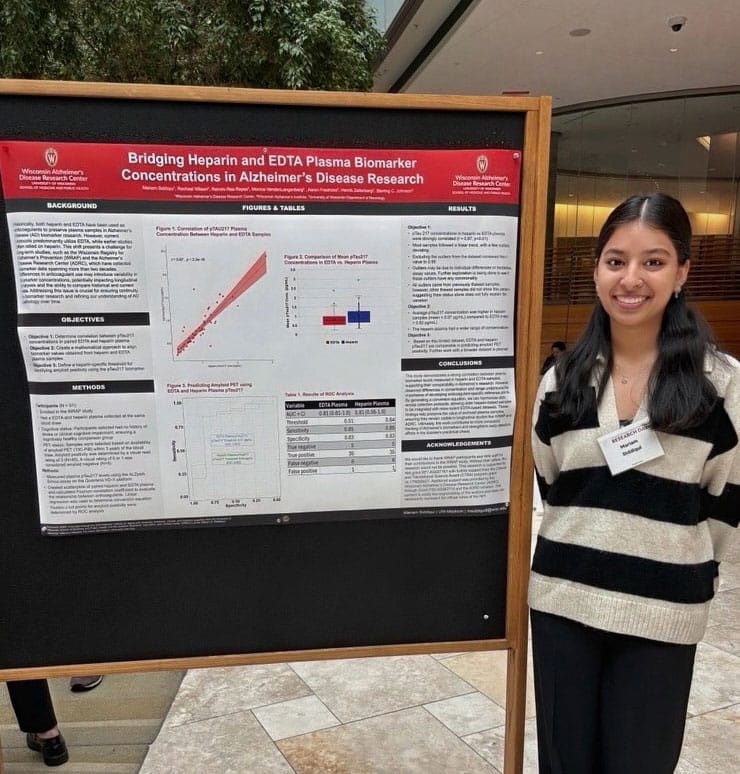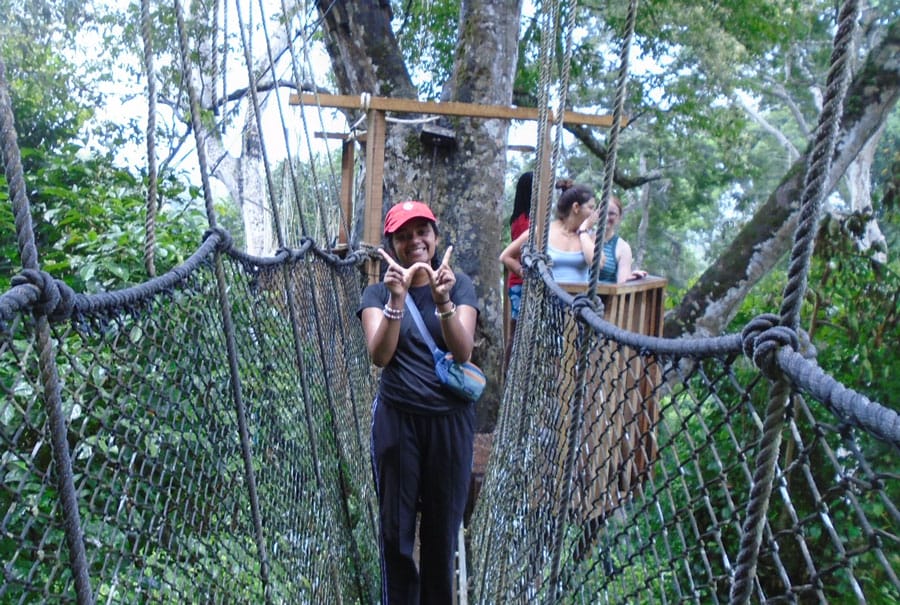

Summer research offers insights into brain health and medical careers
Summer offers a powerful opportunity for discovery. Whether you’re exploring countries far from home, taking a course in an unfamiliar subject, or completing an internship, the summer months offer a unique time to dive a little deeper into the places and questions that matter most to you.
For University of Wisconsin–Madison students like Naureen Kamal, conducting undergraduate research in the summer offers an important — and sometimes personal — avenue for discovery.
“Roughly 14 years ago, my grandmother developed dementia due to Alzheimer’s disease,” Naureen said. “Since she lives in India, I see her on limited occasions, typically with years passing and drastic differences in her status and demeanor. I learned the importance of community-based care and individualized medicine from her experiences, and I have always strived to learn more about this terrible disease.”
Both Naureen and fellow Badger Mariam Siddiqui began conducting undergraduate research at the Wisconsin Alzheimer’s Disease Research Center (ADRC). The ADRC helps scientists search for better ways to diagnose and care for people with Alzheimer’s, while also working toward a larger goal: finding effective ways to prevent and treat the disease.
The benefits of conducting summer research extend beyond academics, too, says Keri Johnson, assistant dean and director for UW–Madison Summer Term. “Summer research experiences can be a launchpad for future success,” she said. “The lab is a great place for students to refine their goals for graduate school, professional programs or entering the workforce. These experiences can meaningfully enrich their time at UW–Madison and help prepare them for their chosen fields.”
Mariam and Naureen spoke with us about how they’re building on that experience in their undergraduate research this summer and shared what they’re learning, how it supports their goals and what else they’re doing during Summer Term.
Mariam Siddiqui
Hometown: Brookfield, Wisconsin
Academics: Double major in neurobiology and psychology
Plans to graduate: May 2026


Mariam Siddiqui presented her poster during the Alzheimer’s Disease & Related Dementias Research Day in April 2025.
Tell us about the research you’re conducting this summer and why you wanted to participate in it.
I’m conducting research at the Medical College of Wisconsin (MCW) in the Meier Lab, which focuses on advancing neuroimaging tools to better understand and track neurological conditions. I connected with this lab through a collaboration between UW–Madison and MCW. My work involves analyzing MRI scans to identify lesions in the brain, specifically looking at white matter hyperintensities. This research contributes to the lab’s goal of improving imaging biomarkers for neurodegenerative diseases and brain injury.
In this role, I am learning to use specialized imaging software to process and interpret MRI data, which has strengthened my technical skills. A typical day involves reviewing scan images, recording observations about lesion size and location and discussing findings with the research team. I wanted to participate because I am interested in neurodegenerative diseases and wanted to gain more experience with neuroimaging techniques. This research is important to me because it helps build tools that can lead to earlier detection and better understanding of conditions like Alzheimer’s disease (AD).
Are you doing any other academic work this summer?
I am taking PSY 225: Research Methods and Zoology 523: Neurobiology — both online courses. I have enjoyed learning about how research studies are designed in PSY 225, and in neurobiology, I have liked exploring how the brain’s structure relates to function. In PSY 225, I recently worked on designing a mock research study, which helped me better understand the process of creating clear research questions and choosing appropriate methods. In neurobiology, I was especially interested in learning about synaptic transmission and how disruptions can contribute to neurological disorders. It has been interesting to see how what I am studying connects to my research.
How is your research and coursework helping you meet your academic and career goals?
Both my research and coursework are helping me build a stronger foundation in neurobiology and psychology. They are helping me develop skills in data analysis, critical thinking and scientific communication that will be valuable for my future academic and professional work.
This experience has also given me the chance to learn from researchers and clinicians in the field, which has helped me think more broadly about how neuroscience connects to public health and health policy. I am grateful for the opportunity to combine coursework and research this summer. It has been rewarding to apply what I am learning to real-world challenges in neuroscience.
Sounds like you have a busy schedule this summer! What else are you doing and how do you like to unwind?
In addition to research and classes, I have an internship at the State Capitol working for State Representative Robyn Vining, who is actually the representative from my hometown of Brookfield!. At my internship, I help with constituent communications, track legislation and prepare materials for meetings and floor sessions. I research bill details like authorship, co-sponsorship, fiscal analyses and ethics disclosures so our office stays well-informed and ready to engage in policy discussions.
I also volunteer with Legal Action of Wisconsin on the Eviction Defense Project, where I help provide support for tenants facing eviction, including preparing documents and assisting with case management.
When I’m not working or studying, I love making the most of summer in Wisconsin. I always look forward to going to Summerfest and the Wisconsin State Fair. To unwind, I enjoy spending time with friends and trying out new coffee shops!
Naureen Kamal
Hometown: Brookfield, Wisconsin
Academics: Major in genetics and genomics; certificates in health policy and global health
Plans to graduate: December 2026
Why is your summer research important, and what drew you to your current lab?
As an undergraduate researcher at the ADRC and the Wisconsin Institutes for Medical Research, I have been able to work directly with research participants to help collect evidence to understand the relationship between the gut microbiome and its impacts on Alzheimer’s and analyze genetic pathways contributing to neurodegeneration, respectively.
Much of the work in the Bendlin Lab focuses on understanding the role of the gut microbiome in Alzheimer’s disease progression, as well as neuroimaging tools and analysis. Both of these areas fascinate me, and I have truly enjoyed learning more about this disease and the novel studies and advances that are currently taking place.
What does your research look like in action for you?
In the Bendlin Lab, I work closely with participants, screening them for eligibility and shipping research kits for sample collection. Part of this process includes data entry and coding based on external coding materials. One of the main studies I work on is the Microbiome and Alzheimer’s Risk Study (MARS), where we screen participants, ship stool sample kits and pilot blood spot collection. These samples are stored and analyzed at the Rey Lab, and we receive the genomic DNA information, which is used for further analysis.
I also work on a few other studies and am currently helping with the launch of a new study focusing on understanding the impact of familial microbial transfer on AD progression between women with AD/cognitive impairments and their cohabitants/offspring.
My independent research is mentored by Darby Peter, a graduate student in the Neuroscience Training Program, and is supported by the College of Agriculture & Life Sciences (CALS) Undergraduate Research Award. I am exploring the impact of appendectomy on individuals enriched with dementia risk and am learning the necessary skills to further explore this relationship with bioinformatics and coding tools. I will be using a few platforms to classify and calculate diversity metrics and abundance of microbial taxa and construct linear regression models to compare microbial diversity and relative abundance using a number of predictors.
How is your research helping you meet your academic and career goals?
I am interested in pursuing a career in the health professions, specifically medicine, and my work with research participants and engaging in these kinds of analyses is incredibly meaningful. As president of UW–Madison’s Advocates for Alzheimer’s (AFA) student organization, I have also had the privilege of networking with a number of geriatricians, principal investigators, scientists, community outreach specialists, administrators and faculty.
These experiences, coupled with my work in the lab, have given me a much more comprehensive understanding of dementia and related disease pathogenesis and geriatrics as a whole.
What else are you doing during Summer Term? And what do you like to do to have fun?
In addition to the lab, I am also working as a certified nursing assistant in the UW Health ICU. I have held this role for roughly 18 months, and it has been an incredibly gratifying and sobering position. My experiences with AFA and in the lab have supplemented my understanding of the struggles patients endure as well.
I am also working as an undergraduate teaching fellow for the CALS QuickStart program. As an alum of this program, I have spent the last two summers helping teach this course, and it is such a fun and rewarding experience to connect with and mentor first-year students. Earlier this summer, I also served as a teaching fellow for the Wisconsin Rural Scholars Program, where we provided lab tours, student experience panels, workshops and more to high school students. I volunteer at the Madison Children’s Museum through Badger Volunteers and am continuing this summer.


During her study abroad trip to Ghana in 2025, Naureen Kamal recalled her UW roots while posing at Kakum National Park’s Canopy Walk.
This May, I participated in an incredible study abroad program that focused on community health and public nutrition in Ghana. There, I was exposed to sustainable agriculture and child malnutrition treatment, and I met so many incredible people and professionals. I observed the tangible benefits of an integrated health system and the role that different health professions play in improving health outcomes. I was also able to recognize how historical events influence contemporary events and the role of international relations in population health.
Outside of these commitments, I plan to travel to India in August to visit my family. I am spending ample time with friends and family, hiking, attending concerts and eating plenty of Kopp’s frozen custard!
Learn more about Undergraduate Research at UW–Madison or talk to your advisor or a faculty member about potential opportunities. And don’t forget to share your summer story by using #MyBadgerSummer on Instagram.
Post written by Jill Schaefer. You can reach her at [email protected].
